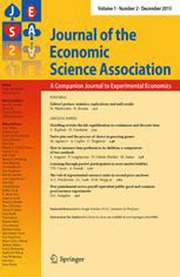Article contents
Conditional cooperation and group size: experimental evidence from a public good game
Published online by Cambridge University Press: 17 January 2025
Abstract
Conditional cooperation is the tendency to cooperate if and only if others do so as well. It is the most common behavior in social dilemmas. We study how the incidence of conditional cooperation in the public goods game, the most widely studied social dilemma in experimental economics, varies with group size. In a laboratory experiment, we apply the strategy method to elicit how participants’ willingness to contribute to a public good depends on other group members’ decisions. A within-subject design allows us to evaluate and compare an individual participant's contribution behavior in different-sized groups. Two main findings emerge. First, the share of players who are conditional cooperators is consistent across group sizes. Second, the strategies chosen imply that conditional cooperators hold a (correct) belief that others are more cooperative in a larger than in a smaller group.
JEL classification
- Type
- Original Paper
- Information
- Copyright
- Copyright © The Author(s), under exclusive licence to Economic Science Association 2023.
Footnotes
We thank the Economic Science Lab at the University of Arizona for funding this project. We thank Price Fishback, Tamar Kugler, Stanley Reynolds, and Julian Romero for helpful comments.
References
- 2
- Cited by


